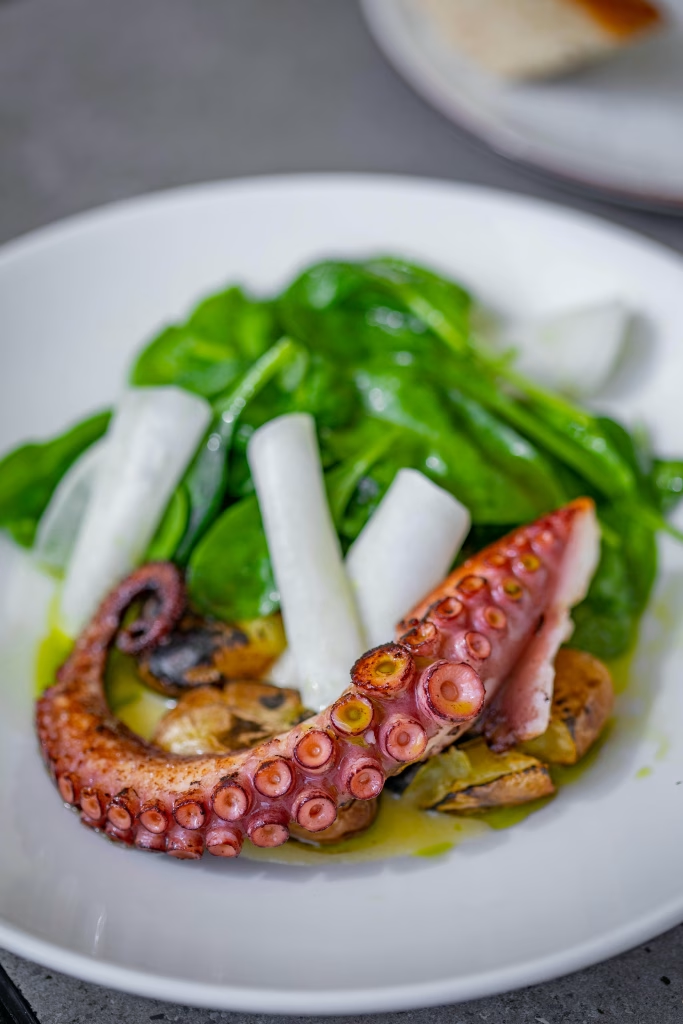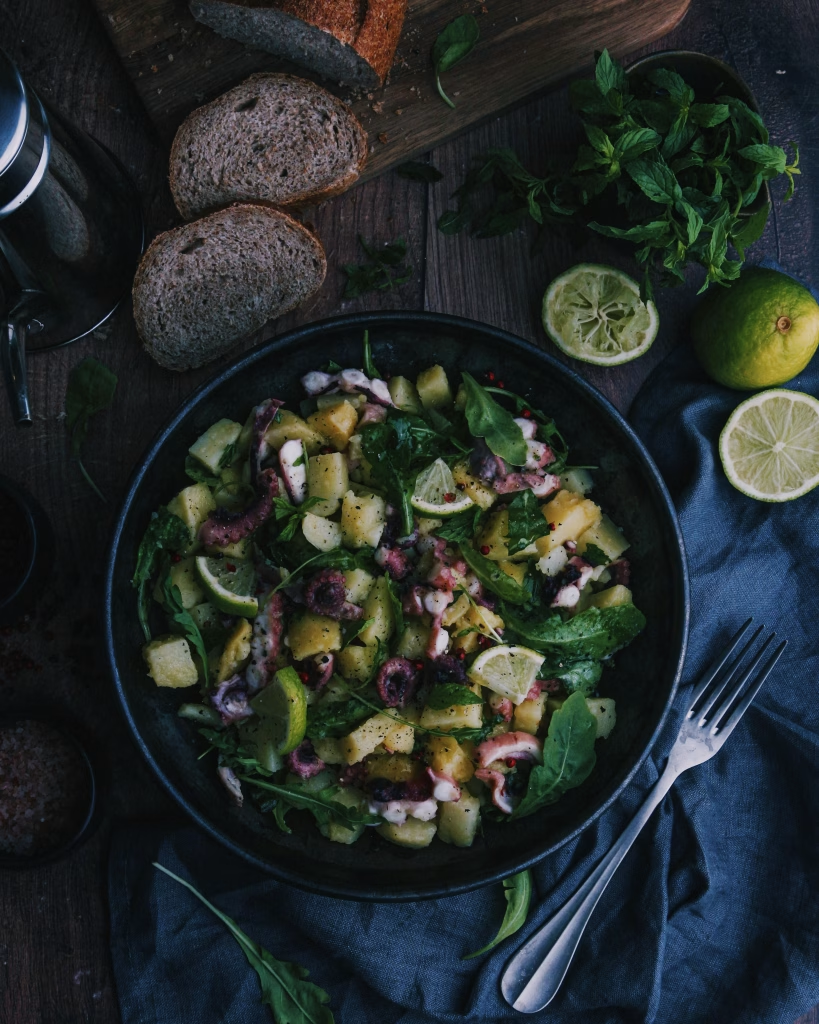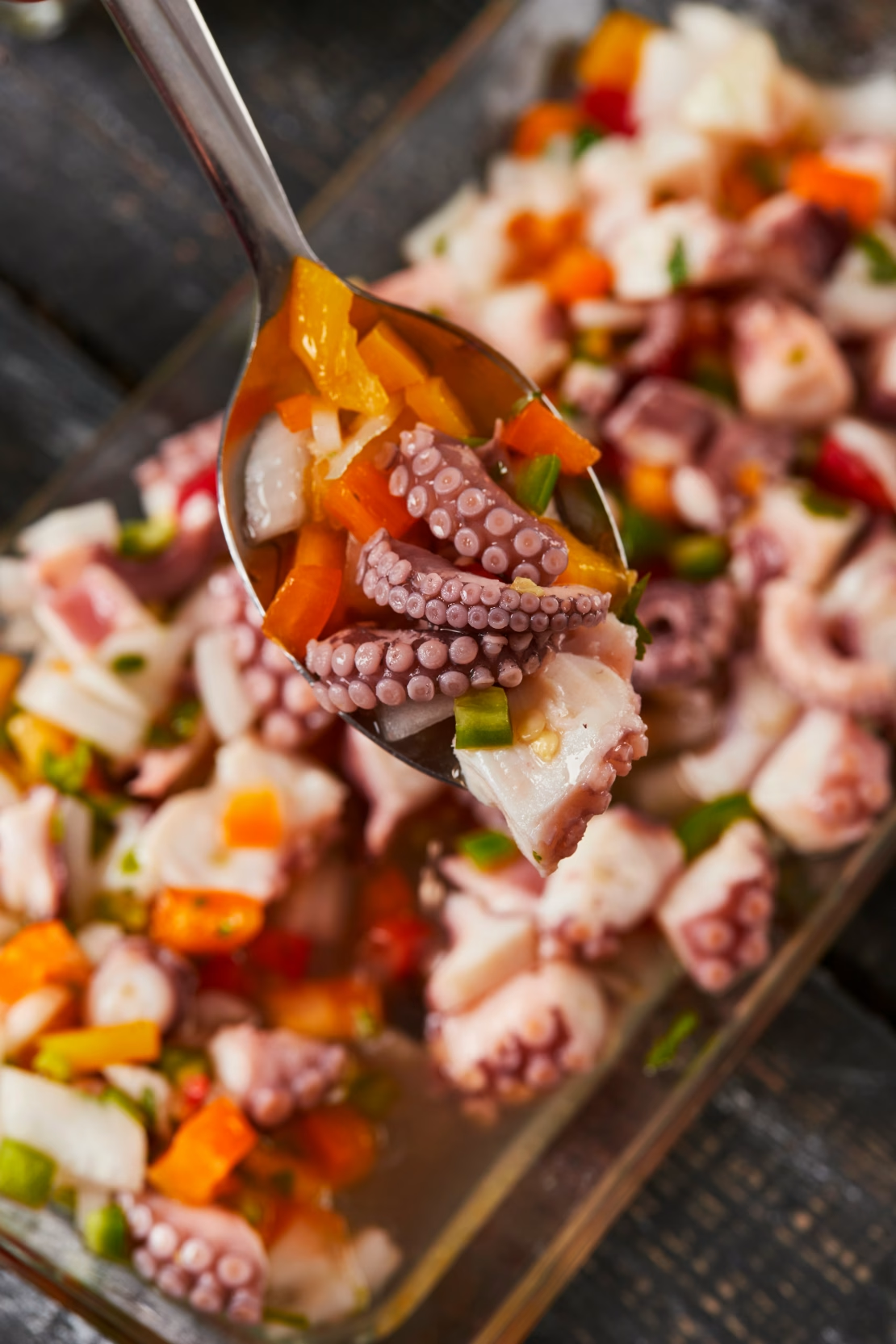Octopus Salad, known locally as “Salada de Polvo,” is a beloved Portuguese dish featuring tender octopus tossed with fresh herbs, olive oil, garlic, and a bright citrus dressing.
It’s a refreshing, light salad with Mediterranean flavors that balances the subtle brininess of octopus with zesty acidity and earthy notes. Served chilled or at room temperature, this salad is a staple at Portuguese tables, especially in coastal areas, where fresh seafood is abundant. Perfect as an appetizer or a light main, Octopus Salad offers a vibrant taste of Portugal’s rich culinary heritage.
Table of Contents
Ingredients
- 2 pounds fresh octopus, cleaned
- 4 cloves garlic, minced
- 1 large red onion, thinly sliced
- 1 red bell pepper, diced
- 1 cucumber, diced
- 1 cup cherry tomatoes, halved
- ¼ cup fresh parsley, chopped
- 2 tablespoons fresh cilantro, chopped (optional)
- Juice of 2 lemons
- 3 tablespoons extra virgin olive oil
- 1 tablespoon red wine vinegar
- 1 teaspoon smoked paprika (pimentón)
- Salt and freshly ground black pepper, to taste
- 1 bay leaf
- 1 teaspoon crushed red chili flakes (optional)
- Mixed salad greens (optional, for serving)
Serves
Serves 4 as an appetizer or light main dish
Step-by-Step Instructions
1. Prepare the Octopus
- Rinse the octopus thoroughly under cold running water.
- Place the octopus in a large pot with enough water to cover, add the bay leaf, and bring to a boil.
- Reduce heat to a gentle simmer and cook for about 45–60 minutes, or until the octopus is tender when pierced with a fork.
- To tenderize, you can add a wine cork or simmer gently without a lid.
- Once cooked, drain and let the octopus cool to room temperature.
2. Slice the Octopus
- Cut the tentacles from the head and slice into bite-sized pieces.
- Discard the head or use it for another recipe.
3. Prepare the Vegetables
- Thinly slice the red onion and soak in cold water for 10 minutes to reduce sharpness; drain well.
- Dice the red bell pepper and cucumber.
- Halve the cherry tomatoes.
- Chop fresh parsley and cilantro.
4. Make the Dressing
- In a small bowl, whisk together lemon juice, olive oil, red wine vinegar, minced garlic, smoked paprika, salt, pepper, and chili flakes if using.
5. Assemble the Salad
- In a large bowl, combine the sliced octopus, red onion, bell pepper, cucumber, tomatoes, parsley, and cilantro.
- Pour the dressing over the salad and toss gently to coat all ingredients evenly.
6. Marinate and Chill
- Cover the salad and refrigerate for at least 1 hour to allow the flavors to meld.
- Serve chilled or at room temperature over a bed of mixed salad greens if desired.

Serving Suggestions
- Serve as a refreshing starter before a seafood feast.
- Accompany with crusty Portuguese bread or grilled country bread for dipping.
- Pair with chilled white wine such as Vinho Verde or Alvarinho.
- Add boiled potatoes or chickpeas for a heartier salad.
- Garnish with lemon wedges and a sprinkle of fresh herbs for extra brightness.
Tips for Perfect Octopus Salad
- Tenderize Properly: Slow simmering is key to tender octopus; avoid boiling vigorously.
- Fresh Octopus Is Best: Use fresh or well-thawed frozen octopus.
- Rest After Cooking: Let octopus cool in the cooking water to stay moist and tender.
- Balance Flavors: Adjust lemon and vinegar for the right acidity to cut through the octopus’ richness.
- Marinate Time: The longer it chills, the more the flavors develop—overnight is ideal.
- Use Quality Olive Oil: A good extra virgin olive oil elevates the dish.
- Add Vegetables for Texture: Fresh, crisp vegetables contrast nicely with tender octopus.

Healthier Alternatives
- Use less oil and substitute half the olive oil with lemon juice or vegetable broth for a lighter dressing.
- Serve with more fresh greens to increase fiber and volume.
- Avoid red wine vinegar if sensitive to acidity; use apple cider vinegar or omit entirely.
- Use steamed or grilled octopus for less added fat.
- Add chickpeas or beans for plant-based protein and fiber.
Creative Variations
- Portuguese-Style with Potatoes: Add boiled baby potatoes cut in halves or quarters.
- Spicy Octopus Salad: Include chopped fresh chili or a pinch of cayenne.
- Mediterranean Twist: Add Kalamata olives, capers, and feta cheese.
- Asian Fusion: Toss in sliced scallions, ginger, and sesame seeds with a soy-lemon dressing.
- Avocado Addition: Creamy avocado cubes complement the acidity and texture.
- Herb Swap: Use basil, mint, or dill instead of parsley and cilantro for varied herbaceous notes.
Common Mistakes to Avoid
- Overcooking Octopus: Leads to rubbery, tough texture.
- Not Drying Octopus Before Dressing: Excess moisture dilutes the flavor.
- Skipping Marination: Salad tastes less cohesive without resting.
- Using Too Much Acid: Overly sour dressing can overpower the delicate octopus.
- Not Removing Bay Leaf Before Serving: It can be tough and unpleasant.
- Ignoring Onion Preparation: Raw onions can be too sharp without soaking.
- Overcrowding the Bowl When Tossing: Causes bruising or breakage of octopus pieces.
History of Octopus Salad
The Sea’s Bounty in Portuguese Cuisine
Portugal’s extensive coastline has deeply influenced its culinary traditions, with seafood occupying a central role in the national diet. Octopus has been prized for centuries, often featured in coastal and island communities where it was abundant and easy to catch. Simple preparations that highlighted the freshness of the seafood, like octopus salads, were common. They offered nourishment and relief from the heat during summer months, perfectly suited to Portugal’s Mediterranean climate.
Regional Variations and Influence
In the Algarve and Lisbon regions, octopus salads are particularly popular, often prepared with minimal ingredients to allow the natural flavors to shine. The use of olive oil, garlic, and fresh herbs reflect the broader Mediterranean influence on Portuguese cuisine. Over time, local variations added ingredients like bell peppers, onions, or smoked paprika, enhancing the salad’s color and flavor complexity. It became a festive dish, served at family gatherings and celebrations.
Modern Popularity and International Appeal
Today, Salada de Polvo is enjoyed not only across Portugal but also in Portuguese communities worldwide. It’s appreciated for its simplicity, health benefits, and versatility. Modern chefs experiment by adding international flavors and new presentations, yet the dish’s soul remains rooted in fresh, simply prepared seafood. As Portuguese cuisine gains global recognition, Octopus Salad stands as a shining example of its coastal culinary heritage.
FAQs about Octopus Salad
1. How do I know when octopus is cooked perfectly?
When a fork easily pierces the thickest part without resistance, the octopus is tender.
2. Can I use canned octopus?
Fresh or frozen octopus is best. Canned octopus has a different texture and is less ideal for this salad.
3. How long can I store leftover salad?
Store in an airtight container in the fridge for up to 2 days; flavors intensify but texture softens.
4. Can I prepare the salad in advance?
Yes, it tastes better after at least an hour of marinating.
5. What can I substitute for red wine vinegar?
Apple cider vinegar or white wine vinegar work well.
6. Is octopus high in cholesterol?
Octopus is relatively low in cholesterol and fat but rich in protein and essential nutrients.
7. How do I clean fresh octopus?
Remove the beak, eyes, and ink sac; rinse thoroughly to remove slime.
8. Can I grill the octopus before making the salad?
Yes, grilling adds smoky flavor but requires tenderizing first.
9. Is octopus salad gluten-free?
Yes, naturally gluten-free if no wheat-containing ingredients are added.
10. What wine pairs best with Octopus Salad?
A crisp white like Vinho Verde or Sauvignon Blanc complements the citrusy dressing.
Octopus Salad embodies the essence of Portuguese coastal cuisine—fresh, vibrant, and elegantly simple. This dish offers a perfect balance of tender seafood with bright, herbaceous, and tangy notes that refresh the palate. Whether enjoyed as a starter or light meal, it brings a taste of the Atlantic’s bounty to your table. With its easy preparation and flexible ingredients, this salad is an inviting gateway into the rich culinary traditions of Portugal’s seaside culture.


